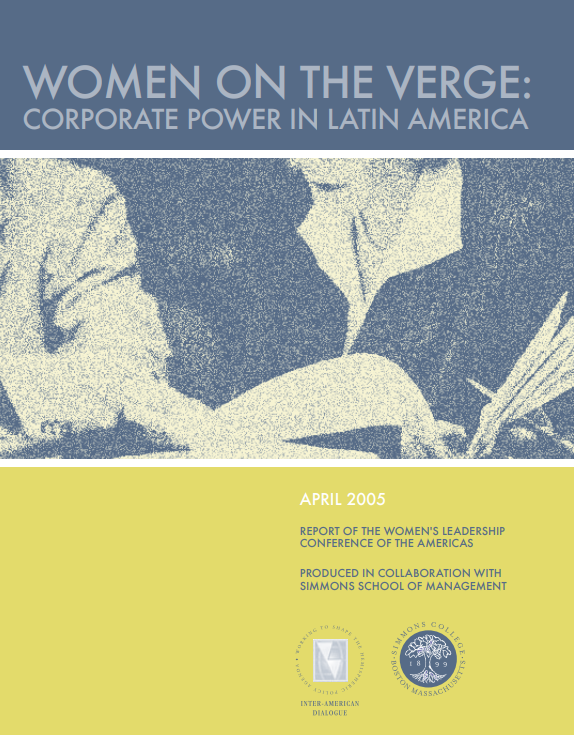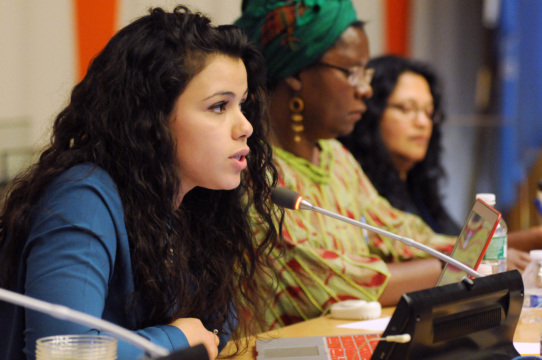What Roles are Women Playing in Mexico’s Drug War?
What roles are women playing in Mexico’s brutal drug trafficking war?
This report tells an amazing success story, one that would have been unthinkable just ten years ago. According to the surveys conducted by the Inter-American Dialogue and Simmons School of Management, women in corporate Latin America are approaching 35 percent at the department/area head and director/manager levels. Clearly, women are a significant force in Latin American firms, advancing steadily through the corporate hierarchy. In fact, their success at achieving management positions in the private sector mirrors their steady expansion of power in the political realm, where women’s participation in legislatures in the region has doubled since 1990—from 8 to over 16 percent. Women are clearly overcoming traditional obstacles to power in government, business, and the professions.
These impressive gains, however, have been uneven across countries, firms, sectors, and functions—and still lag behind women’s educational achievement and their participation in the workforce overall. As with politics, the highest circles of power still remain largely male-dominated—though not for long, we predict. The good news is that the pool of women well trained for business careers is growing across Latin America, although corporations may now be underutilizing them. While there are more women at all levels of the corporate hierarchy and in all job functions, our research findings suggest that Latin American businesswomen still face glass walls and a ceiling. But as we have seen in other parts of the world, women will surely break through these barriers with time, as increasing numbers enroll in nontraditional courses of study and work their way through the ranks in alternate fields. Among the advancement challenges women report, work-family balance is the most crucial. Latin American women tend not to mention discrimination when interviewed about their careers.
These are the major conclusions of a report undertaken by the Inter-American Dialogue and the Simmons School of Management. Based on a review of existing literature, surveys of 75 firms in the region, seven country case studies, and interviews with over 120 senior business women conducted in those same countries—Argentina, Brazil, Chile, Colombia, El Salvador, Mexico, and Venezuela—the project set out to document women’s presence in the Latin American business world, investigate differences across sectors, functions, and generations, and convey senior women’s views of obstacles and opportunities for advancement.
Our goals in undertaking this project were manifold: to facilitate women’s networking and support in the private sector, collect and publicize data, and disseminate our findings to leaders throughout the hemisphere—in particular CEOs and human resource professionals in a position to influence corporate policy, and legislators and government officials with influence over the regulatory environment. There is a clear need for data and analysis on women in business as a basis for private actions and public strategies to take better advantage of talented women in corporate management. Research shows that what is good for women is good for business organizations as a whole, especially for organizational leadership.
We believe that the number of women in leadership is a concrete indicator of an organization’s progress (or lack thereof) toward fulfilling its commitment to equity. The Dialogue has produced this report as part of its continuing efforts to monitor progress by public and private organizations in advancing women into leadership.
The Dialogue’s work on women is carried out under the auspices of the Women’s Leadership Conference of the Americas (WLCA)—a network of 100 women leaders drawn from throughout the hemisphere, dedicated to expanding the numbers and enhancing the contribution of women in top leadership positions in Latin America and the Caribbean—and, in so doing—to helping to improve opportunities for all women. The group’s commitment to this mission is based on the conviction that leadership does matter, and that women in positions of power and influence will contribute in critical ways to the broader expansion of women’s rights and opportunities in all sectors.
WLCA Co-Chairs Ruth de Krivoy of Venezuela and Lourdes Flores Nano of Peru deserve special gratitude for their valuable contributions to the Dialogue’s work on women’s leadership and for their steadfast guidance over the years. We are also grateful for the sustained support of the GE Foundation, The Ford Foundation, and the Simmons School for Management in Boston, without which this report would not have been possible. Special thanks are in order to Sylvia Maxfield for directing the research and writing the report. Her dedication and passion for the subject helped sustain the commitment of our research team. We are particularly grateful to the authors of the country case studies—Cristina Bruschini, Maria Consuelo Cardenas de Santamaria, Lidia Heller, Nelly Letjer, Molly Pollack, Claudia Samayoa, Gina Zabludovsky, Carmen Lazo, Patricia Marquez, and Andrea Puppin—and to Gillian Morejon who co-authored the chapter on labor laws and, with Viviana Coriat helped administer the project. We also want to thank Isabel Londoño and Kelly Alderson for their tireless work collecting survey data in the Andean region and Brazil, respectively.
Peter Hakim
President
Inter-American Dialogue
Joan M. Caivano
Director
Women’s Leadership Conference of the Americas
|
|
What roles are women playing in Mexico’s brutal drug trafficking war?
To what extent have the policies of President Juan Manuel Santos helped or hindered businesses in Colombia?
How are women faring in Latin America? Where has progress been made and how has that been achieved?


